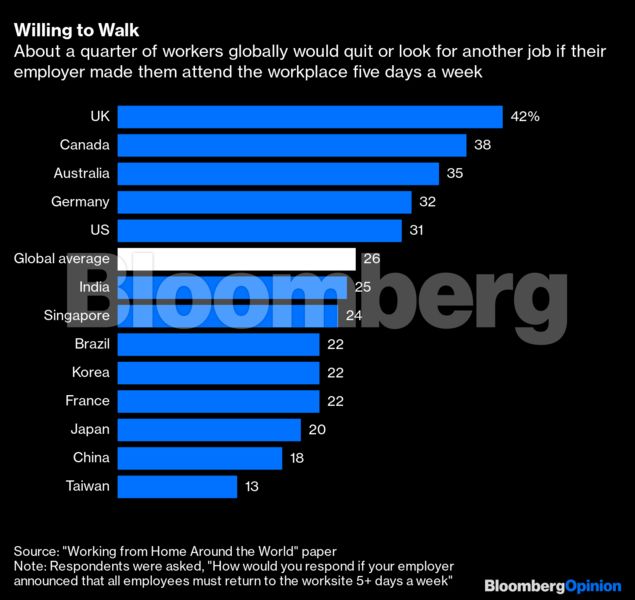(Bloomberg Opinion) -- It’s time to come clean. Maybe it’s an age thing, a lack of imagination, a desperate void where my soul should be? I don’t know, but I just can’t see why anyone wants to spend their every working day quietly at home. During lockdown, I never bought an office chair or flat-pack desk — the front room is cluttered enough, thank you. There’s nothing wrong with my kitchen, but I don’t want to spend all day there. Give me people, chatter, movement and, sure, free snacks!
Mystifyingly, the opposite is true for many others. Globally, about one-quarter of mainly white-collar, higher-income workers would quit if told to return to the office five days a week, according to an international team of economists who’ve been gathering data since early in the pandemic. Seems kind of extreme to me: I don’t know many people who could take that much financial or career risk.

Regardless, the battle lines are being drawn, especially in banking where the biggest Wall Street names such as Goldman Sachs Group Inc. and Morgan Stanley are apparently demanding that staff get back to their desks after two years of playing nice. But this fight won’t be as fierce as it sounds. For one thing, labor markets probably aren’t as tight as headline employment data suggest, which means it’s already harder for staff to demand a better deal or jump ship if they don’t get it. On a more positive note, your boss very likely wants some flexibility, too.
Office avoiders in high finance may have the weakest hand already: Skittish markets and uncertain executives have crashed advisory and capital markets revenue this year globally. Activity could rebound a bit in September after a summer lull, but revenue in the third quarter so far is half that of the same summer months last year, according to Anke Reingen, banks analyst at RBC Capital Markets. Year-to-date fees are down 39% versus 2021.
Banks have already cut staff in some areas, as UBS Group AG and HSBC Holdings Plc have done in China, and could examine personnel levels further in the final quarter.
This will be a stark change from the brawl between lenders during the pandemic, when they had to attract and retain staff amidst a rush of fundraising and dealmaking. Banks were swamped with work, while a tech-industry and private equity boom offered riches and more excitement elsewhere, particular for the young. At the height of the recent war for talent, all you needed was a heartbeat and some excel skills to get hired on a great base salary, while being allowed to work from anywhere.
Those days have gone. Leaders want their teams, especially younger members, around more. They want to keep an eye on them, they want to communicate with them efficiently, and most of all they want them to quickly learn how to do things the way their banks want them done.
I buy into most of this. When it comes to spreading the intangible human capital of knowhow, institutional memory and collaboration, in-person is best. Doing everything over video or email also makes working relationships more transactional. It scrapes away the soft edges of human contact that help us tolerate each others’ demands.
In finance, regulatory obligations over monitoring activity and communications is paramount and ever more complicated. See the current round of $200 million fines over WhatsApp use at major banks. But smart bosses also want to keep an eye on their workers’ emotional states, especially in high-stress environments. As a cold fact, that can help prevent disasters large and small.
Yet when demanding a return to the office, leaders should be honest about the flexibility they have enjoyed themselves. They have kids who have sports days, or parents who need help making appointments, or maybe even DJ slots at West Coast parties on Fridays. Most people have some kind of life beyond work, right?
More seriously, lots of people have care responsibilities that can conflict with strict office hours. The international survey found that women value remote work more highly than men. Economies benefit from ensuring everyone can participate in the workforce as much as they want or can. Technology and improvements in employment law in some countries had already pushed more companies to offer flexible or hybrid working even before the pandemic. Competition to be an attractive employer with decent conditions and benefits will also survive the next jobs downturn. Even hard-charging Goldman Sachs had increased paid parental leave to 20 weeks regardless of gender before the Covid pandemic.
Different white-collar jobs have different demands for office attendance, of course. If you’re an investment banking rainmaker, you really shouldn’t be in the office that much — you should be with clients and prospects drumming up business. If you’re a critical technician for corporate IT systems, chances are you won’t have done much work from home at all.
Lots of us office workers are somewhere in between and we should feel lucky for it. Even if power is shifting back to employers, our future work lives will retain some flexibility, too. It’s fine if people want to work from home a bit. I’ll be mostly here, though.
To contact the author of this story:
Paul J. Davies at [email protected]
© 2022 Bloomberg L.P.





